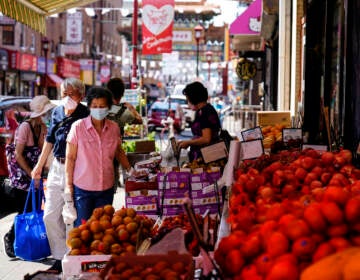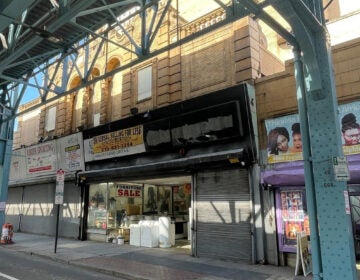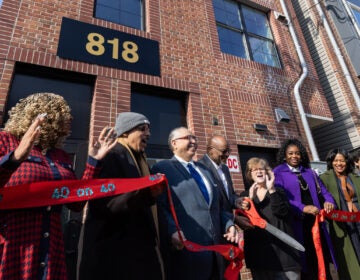The 76ers’ proposed arena could give Market East the lifeline it needs
The 76ers' proposed arena isn’t happening tomorrow — we have time to vet, analyze, and give careful consideration, argues former Philly Mayor Michael A. Nutter.
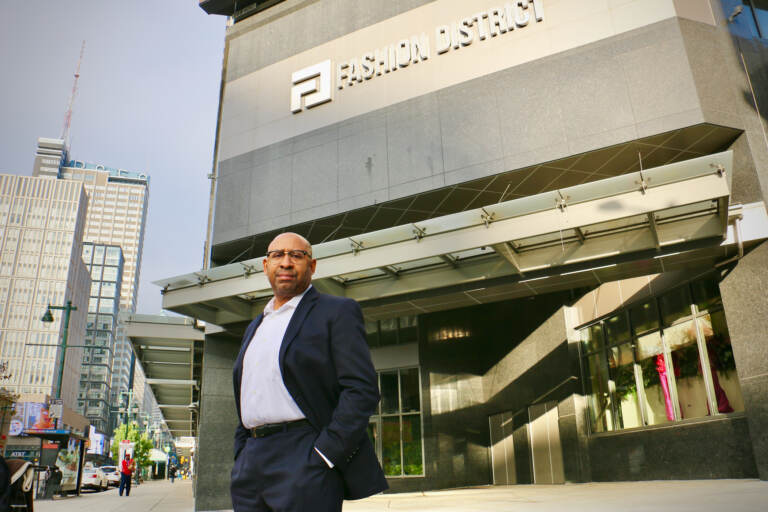
Former Philadelphia Mayor Michael A. Nutter at the entrance to the Fashion District at 10th and Market streets,. (Emma Lee/WHYY)
Philadelphia sports teams — the best sports fans in the world — are on fire.
The Phillies are in the World Series. The Eagles are 7-0, matching their record best start ever from 2004, the Philadelphia Union is going to the MLS Cup final for the first time, the 76ers are pulling things together, and the Flyers are off to a good start as well. I can’t remember when all of our teams had so much success and have generated so much excitement at the same time. All five major professional sports teams are poised for great success in the 2022-2023 seasons.
These teams lift our spirits, create joy and excitement, and are sources of “Philly-style” civic pride that people around the world know and hear about all the time. All of this activity also boosts the economy, generates retail, restaurant and hospitality revenues, and reminds us that we really are one big city and region, with many interests and challenges.
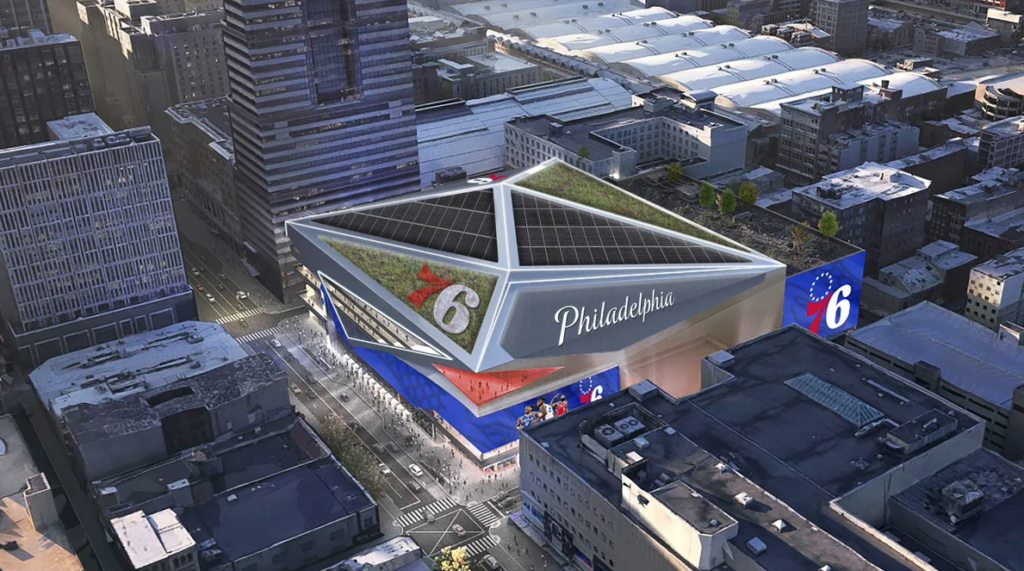
Philadelphians love to debate — whether it’s sports, politics, or the latest big idea. And one of those debates is happening right now.
Over the last three months, there have been a variety of opinions — both supportive and oppositional — in response to the 76ers proposed arena at Market East, and valid arguments have been made on both sides. The debate has revolved around the question: What will it mean for Philadelphia and Center City if the 76ers build an arena at Market East?
But there’s another question we must ask: What happens if the proposed arena doesn’t move forward because we kill it before we have the opportunity to thoroughly assess all possible outcomes for Market East?
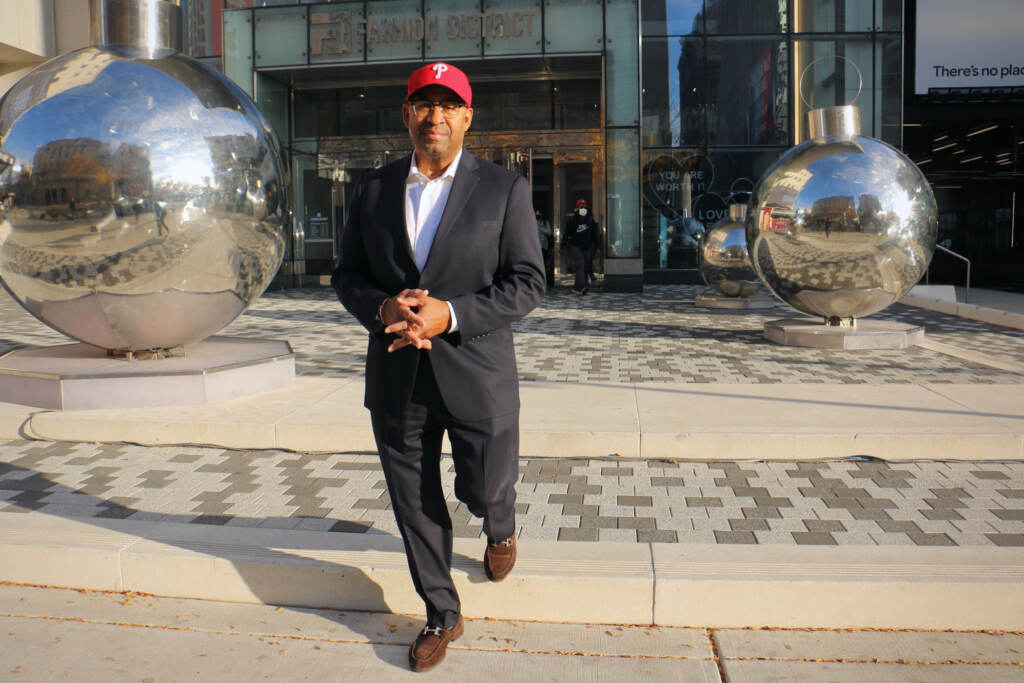
In 1984 when Liberty Place was proposed, there was significant opposition to any building taller than City Hall. The Daily News informally polled Philadelphians who opposed it 3,809 to 1,822. An estimated 300 people organized to oppose it before it was even presented to the city planning commission. Eventually, it was approved. But what would our city look like if we never gave that idea a chance? Not just our skyline, but the jobs and opportunities that Center City’s growth has afforded us to keep pace with other cities.
Today, there is a great amount of uncertainty, given the possibility of a recession, about the future of our downtown particularly in this corridor of Market Street.
I managed Philadelphia through the Great Recession and oversaw the continued revitalization of Center City. The private investments fueling the proposed arena don’t come along often and if things continue as they are, I remain concerned about the ability of the Fashion District, which replaced the old Gallery mall, to thrive. If you’ve been inside the mall or along the sidewalks, you know the concern is real, regardless of what side of the arena debate you stand. This is prime real estate that must be leveraged to equitably grow our economy and create productive activity around Market East. If Fashion District were to falter, the increased blight and vacancies alongside decreasing property values will deter people from downtown and harm businesses, residents, and our tax base. That cannot be an acceptable outcome for anyone.
Alternatively, what if Fashion District is bought and developed by someone else? The site is currently zoned for mixed-use development, allowing for maximum height and density without any zoning variances or input from the community.
Someone can build a skyscraper or luxury mixed-use tower with little consideration for affordability or the impact on the surrounding neighborhoods, namely Chinatown. To be clear, a new owner of the mall may not have an interest in engaging with and investing in the community like the 76ers have committed to doing. Practically speaking, a new owner would have no real need to engage with the community, since they can build by right. With the 76ers, we have a developer who is asking the right questions: What is the impact on residents and businesses? Will this change the culture and identity of our communities? How can we shape this investment in a way that leaves everyone better off? Let’s allow these questions to be asked and answered.
The fact is that a Market East arena would create new jobs — jobs that we desperately need as we continue to struggle with challenges of poverty and income inequality. The proposed location avoids the common practice of arena development that uses eminent domain to displace residents and businesses and breaks up communities. Further, while there is debate about whether cities really benefit from the hundreds of millions they often give to stadium projects, we don’t need to wonder here — this would be the only fully privately funded arena in Philadelphia and that will help our tax base.
So, if our goal is to do what is best for the city and support and preserve Chinatown, what path forward gives us the best opportunity?
The 76ers are proposing a project that could give Market East the lifeline it needs. They are meeting with community members regularly to listen and learn and have pledged to propose a robust community benefits agreement for consideration before the project would move forward. They have put together a development team with Mosaic Development Partners, a Black-owned firm, that has a long track record of development that benefits existing residents and preserves communities.
This project isn’t happening tomorrow, and we have time to vet, analyze, and give careful consideration. While some have called to oppose it immediately, I encourage everyone to keep an open mind so we can truly understand what this could mean for all Philadelphians. Philadelphia is the birthplace of freedom, liberty, and democracy, and in a democracy, we debate, discuss, and then decide. Let the debate begin.
Michael A. Nutter is the former mayor of Philadelphia, serving the city from 2008 through 2016.
 WHYY is one of over 20 news organizations producing Broke in Philly, a collaborative reporting project on solutions to poverty and the city’s push towards economic justice. Follow us at @BrokeInPhilly.
WHYY is one of over 20 news organizations producing Broke in Philly, a collaborative reporting project on solutions to poverty and the city’s push towards economic justice. Follow us at @BrokeInPhilly. 
Subscribe to PlanPhilly
WHYY is your source for fact-based, in-depth journalism and information. As a nonprofit organization, we rely on financial support from readers like you. Please give today.



